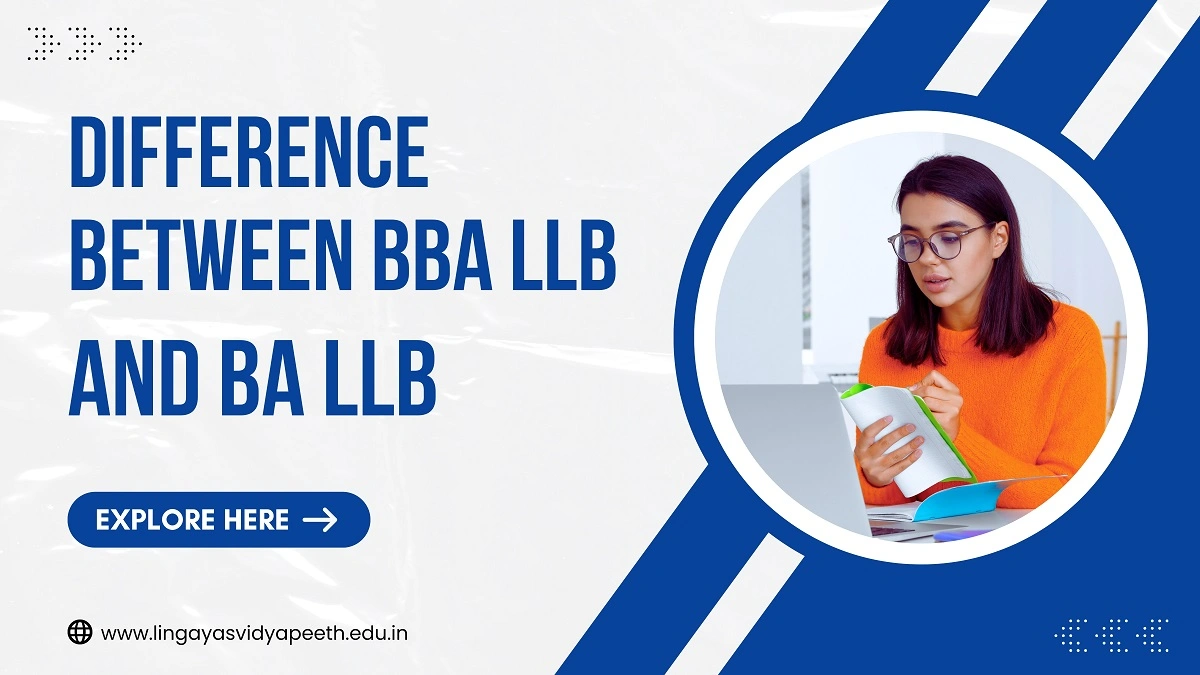Home » Difference Between BBA LLB and BA LLB: Know the Eligibility

Have you completed your 12th and are now confused about the difference between BBA LLB and BA LLB? Wondering which one to choose for your higher studies?
With India’s legal industry booming at ₹1.5 lakh crore in 2025 (IBEF) and an estimated need for 1.2 million legal professionals by 2030 (Bar Council of India, 2025), both programs promise vibrant careers in law, business, or public service. But which one aligns with your dreams?
This blog explores the BA LLB and BBA LLB difference, diving into eligibility criteria, syllabus, career opportunities, job prospects, and salary comparison. We’ll also highlight Lingaya’s Vidyapeeth, a premier university for BA LLB and BBA LLB programs in India. Let’s chart the perfect path for your legal career.
Both degrees prepare you for a legal career, but their focus and applications vary. Let’s discuss the difference between bba llb and ba llb to help you decide.
Here’s a detailed comparison table, including full forms and duration:
| Aspect | BA LLB | BBA LLB |
| Full Form | Bachelor of Arts and Bachelor of Laws | Bachelor of Business Administration and Bachelor of Laws |
| Duration | 5 Years | 5 Years |
| Core Focus | Humanities (history, sociology, political science) + Legal Studies | Business Management (finance, marketing, HR) + Legal Studies |
| Key Subjects | Constitutional Law, Criminal Law, Sociology, Political Science | Corporate Law, Financial Management, Marketing, Business Ethics |
| Best Suited For | Litigation, judiciary, human rights, public policy | Corporate law, compliance, business consultancy, startups |
| Work Setting | Courts, NGOs, government agencies, law firms | MNCs, corporate law firms, startups, regulatory bodies |
| Skills Developed | Legal research, advocacy, policy analysis | Business strategy, contract drafting, corporate compliance |
| Practical Learning | Moot courts, legal aid projects | Corporate internships, business law simulations |
Example: A BA LLB graduate may represent a criminal case in court, while a BBA LLB graduate might guide startups like Zomato on corporate laws and compliance.
Both programs are open to 12th graders with similar entry requirements:
Lingaya’s Vidyapeeth in Delhi NCR offers a streamlined, merit-based admission process, making its BA LLB and BBA LLB programs accessible to motivated students.
The curriculum shapes your skills and career trajectory:
At Lingaya’s Vidyapeeth, practical learning takes center stage—BA LLB students gain courtroom experience through moot courts, while BBA LLB students engage in real-world corporate simulations.
Your decision between BA LLB and BBA LLB depends on your interests and aspirations:
Lingaya’s Vidyapeeth provides tailored counselling to align your ambitions with its BA LLB and BBA LLB programs.
Both programs open doors to diverse career paths:
Lingaya’s Vidyapeeth enhances BA LLB and BBA LLB career opportunities through partnerships with 100+ recruiters, including top firms like Trilegal, offering packages up to ₹14 LPA.
Salaries reflect each program’s specialization:
Example: A Lingaya’s BBA LLB graduate joined Deloitte as a legal consultant at ₹9 lakhs, outearning BA LLB peers at entry level.
Lingaya’s Vidyapeeth, NAAC-accredited, is a top choice for BA LLB and BBA LLB:
Joining Lingaya’s BA LLB or BBA LLB is easy:
We now understand that your career goals determine whether BA LLB or BBA LLB is the right choice. BA LLB is ideal for those interested in litigation, public service, or social justice, while BBA LLB aligns with careers in corporate law and business strategy. With India’s legal industry expanding rapidly, both paths offer excellent job prospects and lucrative salaries.
Also Read
Difference between Pharmaceutical and Medical Microbiology
Difference between Bcom and Bcom honours
High salary career options in Medical without NEET
High salary courses after 12th Commerce
High salary courses after 12th Computer Science
From
Lingaya’s Vidyapeeth
Best University in Faridabad
RECENT POSTS
CATEGORIES
TAGS
Agriculture Agriculture future AI Architecture artificial intelligence Bachelor of Commerce BA English BA Psychology BTech AIML BTech CSE BTech cybersecurity BTech Engineering Business management career Career-Specific Education career guide career option career scope Civil engineering commerce and management Computer Science Computer science engineering Data science degree education Engineering Engineering students English Literature english program Fashion Design Fashion design course Higher Education Journalism journalism and mass communication law Law career Machine Learning mathematics MBA MBA specialization Mechanical Engineering Pharmacy Psychology Research and Development students
LV only conducts physical/online verification of any document related to examination on the following email id:
It is important to note that the following email IDs and domains are fraudulent and do not belong to our university.